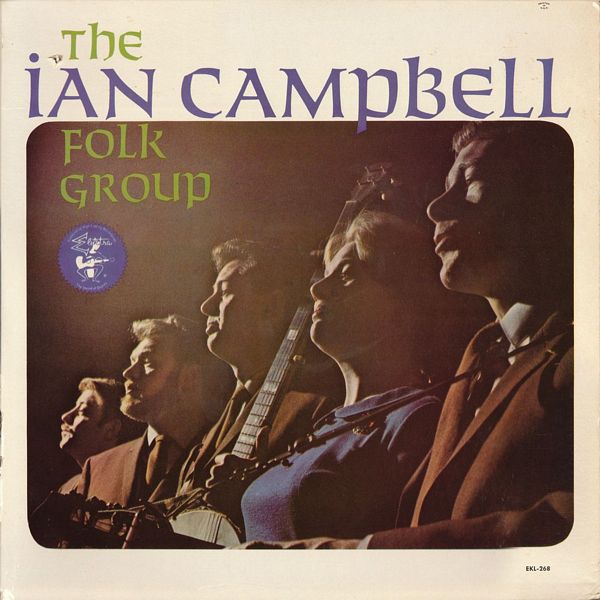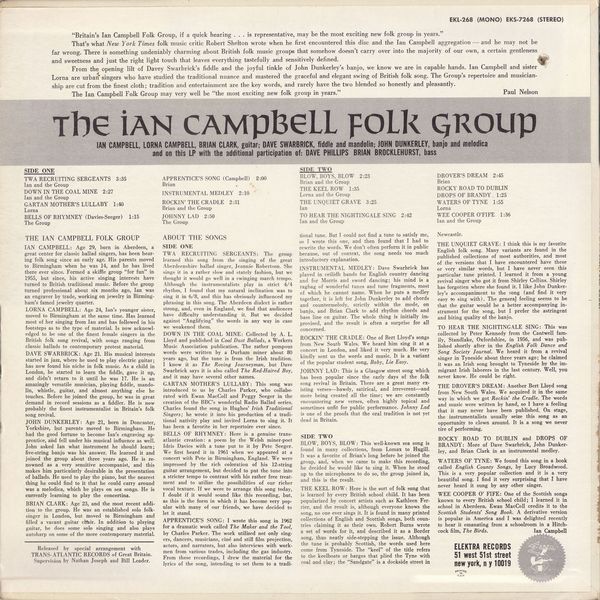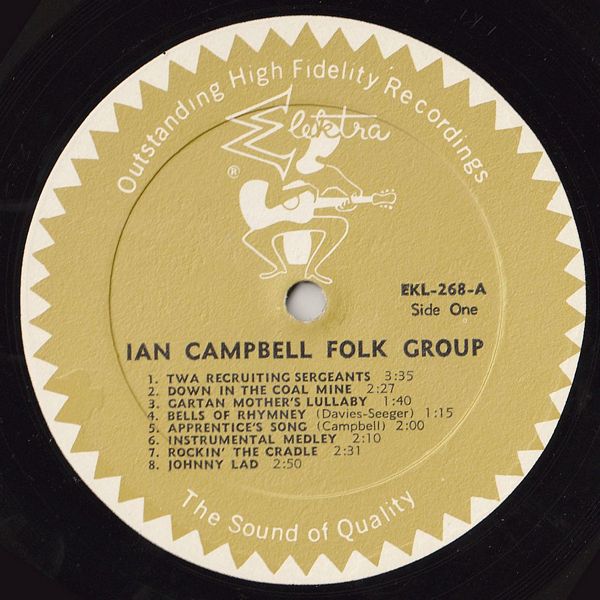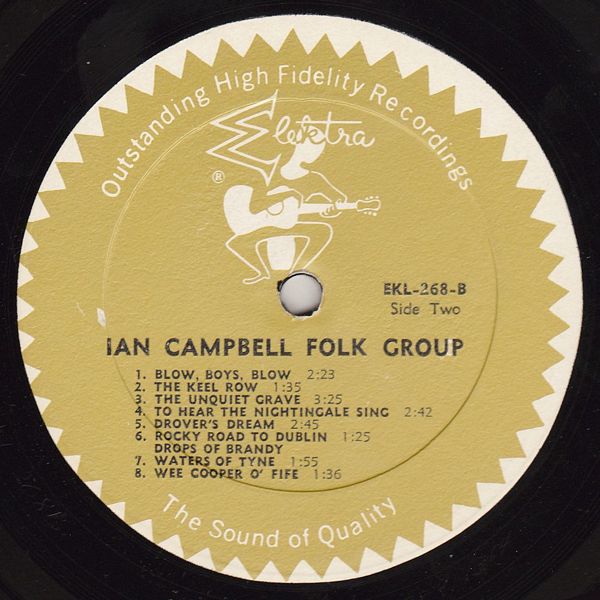

 |


 |
Sleeve Notes
"Britain's Ian Campbell Folk Croup, if a quick Hearing … is representative, may be the most exciting new folk group in years."
That's what New York Times folk music critic Robert Shelton wrote when he first encountered this disc and the Ian Campbdl aggregation — and he may not be far wrong. There is something undeniably charming about British folk music groups that somehow doesn't carry over into the majority of our own, a certain gentleness and sweetness and just the right light touch that leaves everything tastefully and sensitively defined.
From the opening lilt of Davey Swarbrick's fiddle and the joyful tinkle of John Dunkerley's banjo, we know we are in capable hands. Ian Campbell and sister Lorna are urban singers who have studied the traditional nuance and mastered the graceful and elegant swing of British folk song. The Group's repertoire and musicianship are cut from the finest cloth; tradition and entertainment are the key words, and rarely have the two blended so honestly and pleasantly.
The Ian Campbell Folk Group may very well be "the most exciting new folk group in years."
Paul Nelson
THE IAN CAMPBELL FOLK GROUP
IAN CAMPBELL: Age 29, horn in Aberdeen, a great center for classic ballad singers, has been hearing folk song since an early age. His parents moved to Birmingham when he was 14, and he has lived there ever since. Formed a skiffle group "for fun" in 1955, but since, his active singing interests have turned to British traditional music. Before the group turned professional about six months ago, Ian was an engraver by trade, working on jewelry in Birmingham's famed jewelry quarter.
LORNA CAMPBELL: Age 24, Ian's younger sister, moved to Birmingham at the same time. Has learned most of her singing from Ian and has followed in his footsteps as to the type of material. Is now acknowledged to be one of the finest female singers in the British folk song revival, with songs ranging from classic ballads to contemporary protest material.
DAVE SWARBRICK: Age 21. His musical interests started in jazz, where he used to play electric guitar; has now found his niche in folk music. As a child in London, he started to learn the fiddle, gave it up, and didn't return to it until he was 17. He is an amazingly versatile musician, playing fiddle, mandolin, whistle, guitar, and almost anything else he touches. Before he joined the group, he was in great demand in record sessions as a fiddler. He is now probably the finest instrumentalist in Britain's folk song revival.
JOHN DUNKERLEY: Age 21, born in Doncaster, Yorkshire, but parents moved to Birmingham. He had the good fortune to become Ian's engraving apprentice, and fell under his musical influence as well. John asked Ian what instrument he should learn; five-string banjo was his answer. He learned it and joined the group about three years ago. He is renowned as a very sensitive accompanist, and this makes him particularly desirable in the presentation of ballads. He used to play the piano, but the nearest thing he could find to it that he could carry around was a melodica, which he plays on sea songs. He is currently learning to play the concertina.
BRIAN CLARK: Age 23, and the most recent addition to the group. He was an established solo folk-singer in London, but moved to Birmingham and filled a vacant guitar chair. In addition to playing guitar, he does some solo singing and also plays autoharp on some of the more contemporary material.
ABOUT THE SONGS
TWA RECRUITING SERGEANTS: The group learned this song from the singing of the great Aberdeenshire ballad singer, Jeannie Robertson. She sings it in a rather slow and stately fashion, but we thought it would go well in a swinging march tempo. Although the instrumentalists play in strict 4/4 rhythm, I found that my natural inclination was to sing it in 6/8, and this has obviously influenced my phrasing in this song. The Aberdeen dialect is rather strong, and, even in England, we find that audiences have difficulty understanding it. But we decided against "Anglifying" the words in any way in case we weakened them.
DOWN IN THE COAL MINE: Collected by A. L. Lloyd and published in Coal Dust Ballads, a Workers Music Association publication. The rather pompous words were written by a Durham miner about 80 years ago, but the tune is from the Irish tradition. 1 know it as The Roving Journeyman, but Dave Swarbrick says it is also called The Red-Haired Hoy, and it may have several other names.
GARTAN MOTHER'S LULLABY: This song was introduced to us by Charles Parker, who collaborated with Ewan MacColl and Peggy Seeger in the creation of the BBC's wonderful Radio Ballad series. Charles found the song in Hughes' Irish Traditional Singers; he wrote it into his production of a traditional nativity play and invited Lorna to sing it. It has been a favorite in her repertoire ever since.
BELLS OF RHYMNEY: Here is a genuine transatlantic creation: a poem by the Welsh miner-poet Idris Davies with a tune put to it by Pete Seeger. We first heard it in 1961 when we appeared at a concert with Pete in Birmingham, England. We were impressed by the rich coloration of his 12-string guitar arrangement, but decided to put the tune into a stricter tempo to contrast with his rather free treatment and to utilize the possibilities of our richer vocal texture. If we were to arrange this song today, I doubt if it would sound like this recording, but, as this the form in which it has become very popular with many of our friends, we have decided to let it stand.
APPRENTICE'S SONG: I wrote this song in 1962 for a dramatic work called The Maker and the Tool, by Charles Parker. The work utilized not only singers, dancers, musicians, cine and still film projection, actors, and narrators, but also interviews with workmen from various trades, including the gas industry. From these recordings, I drew the material for the lyrics of the song, intending to set them to a traditional tune. But I could not find a tune to satisfy me, so I wrote this one, and then found that I had to rewrite the words. We don't often perform it in public because, out of context, the song needs too much introductory explanation.
INSTRUMENTAL MEDLEY: Dave Swarbrick has played in ceilidh bands for English country dancing and for Morris and sword dancing; his mind is a ragbag of wonderful tunes and tune fragments, most of which he cannot name. When he puts a medley together, it is left for John Dunkerley to add chords and countermelody, strictly within the mode, on banjo, and Brian Clark to add rhythm chords and bass line on guitar. The whole thing is initially improvised, and the result is often a surprise for all concerned.
ROCKIN' THE CRADLE: One of Bert Lloyd's songs from New South Wales. We heard him sing it at a concert in London, and liked it very much. He very kindly sent us the words and music. It is a variant of the popular student song. Baby, Lie Easy.
JOHNNY LAD: This a Glasgow street song which has been popular since the early days of the folk song revival in Britain. There are a great many existing verses — bawdy, satirical, and irreverent — and more being created all the time; we are constantly encountering new verses, often highly topical and sometimes unfit for public performance. Johnny Lad is one of the proofs that the oral tradition is not yet dead in Britain.
BLOW, BOYS, BLOW: This well-known sea song is found in many collections, from Lomax to Hugill. It was a favorite of Brian's long before he joined the group, and, when we came to make this recording, he decided he would like to sing it. When he stood up to the microphones to do so, the group joined in, and this the result.
THE KEEL ROW: Here is the sort of folk song that is learned by every British school child. It has been popularized by concert artists such as Kathleen Ferrier, and the result is, although everyone knows the song, no one ever sings it. It is found in many printed collections of English and Scottish songs, both countries claiming it as their own. Robert Burns wrote a set of words for it, and described it as a Border song, thus neatly side-stepping the issue. Although the tune is probably Scottish, the words used here come from Tyneside. The "keel" of the title refers to the keelboats or barges that plied the Tyne with coal and clay; the "Sandgate" is a dockside street in Newcastle.
THE UNQUIET GRAVE: I think this my favorite English folk song. Many variants are found in the published collections of most authorities, and most of the versions that I have encountered have these or very similar words, but I have never seen this particular tune printed. I learned it from a young revival singer who got it from Shirley Collins. Shirley has forgotten where she found it. I like John Dunkerley's accompaniment to the song (and find it very easy to sing with). The general feeling seems to be that the guitar would be a better accompanying instrument for the song, but I prefer the astringent and biting quality of the banjo.
TO HEAR THE NIGHTINGALE SING: This was collected by Peter Kennedy from the Cantwell family, Standlake, Oxfordshire, in 1956, and was published shortly after in the English Folk Dance and Song Society Journal. We heard it from a revival singer in Tyneside about three years ago; he claimed it was an Irish song brought to Tyneside by the immigrant Irish laborers in the last century. Well, you never know. He could be right.
THE DROVER'S DREAM: Another Bert Lloyd song from New South Wales. We acquired it in the same way in which we got Rockin' the Cradle. The words and music were written by hand, so I have a feeling that it may never have been published. On stage, the instrumentalists usually seize this song as an opportunity to clown around. It is a song we never tire of performing.
ROCKY ROAD TO DUBLIN and DROPS OF BRANDY: More of Dave Swarbrick, John Dunkerley, and Brian Clark in an instrumental medley.
WATERS OF TYNE: We found this song in a book called English County Songs, by Lucy Broadwood. This a very popular collection and it is a very beautiful song. I find it very surprising that I have never heard it sung by any other singer.
WEE COOPER O' FIFE: One of the Scottish songs known lo every British school child; I learned it in school in Aberdeen. Ewan MacColl credits it to the Scottish Students' Song Rook. A derivative version is popular in America and I was delighted recently to hear it emanating from a schoolroom in a Hitchcock film. The Birds.
Ian Campbell